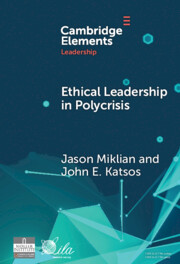
-
- You have access
- Open access
- Cited by 3
-
Cited byCrossref Citations
This Element has been cited by the following publications. This list is generated based on data provided by Crossref.
Wassenaar, Christina L. Pearce, Craig L. and Lorinkova, Natalia 2025. Shared Leadership 2.0.
Miklian, Jason and Katsos, John E. 2025. Ethical Leadership in Conflict and Crisis.
David, Edward A. 2025. Leadership by Example.
- Publisher:
- Cambridge University Press
- Online publication date:
- May 2024
- Print publication year:
- 2025
- Online ISBN:
- 9781009446891
- Creative Commons:
-
This content is Open Access and distributed under the terms of the Creative Commons Attribution licence CC-BY 4.0 https://creativecommons.org/creativelicenses
- Series:
- Elements in Leadership
- Subjects:
- Management: General Interest, Management


